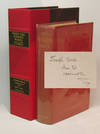![[RARE MANUSCRIPTS / THE AGRARIAN REFORM OF OTTOMAN BOSNIA 1840-1877] Bilingual huge early manuscript historical document in Serbo-Croatian (Cyrillic) and Ottoman Turkish (Arabic) documenting the detailed tax questions and between a Serbian müstâcir (a land tenant) in farmland in Travnik city of Bosnia and Herzegovina and by the landlord Muslim named Mehmed Beyzâde Sems Bey, prepared in fî 15 Tesrîn 1276 [1858-59], same year with the Safer Ordinance, by which a serious Agrarian Reform was aimed in Bosnia by the Ottoman government.](https://d3525k1ryd2155.cloudfront.net/h/362/458/1586458362.0.m.jpg)
[RARE MANUSCRIPTS / THE AGRARIAN REFORM OF OTTOMAN BOSNIA 1840-1877] Bilingual huge early manuscript historical document in Serbo-Croatian (Cyrillic) and Ottoman Turkish (Arabic) documenting the detailed tax questions and between a Serbian müstâcir (a land tenant) in farmland in Travnik city of Bosnia and Herzegovina and by the landlord Muslim named Mehmed Beyzâde Sems Bey, prepared in fî 15 Tesrîn 1276 [1858-59], same year with the Safer Ordinance, by which a serious Agrarian Reform was aimed in Bosnia by the Ottoman government.
by N.A
- Used
- very good
- Condition
- Very Good
- Seller
-
Istanbul, Turkey
Payment Methods Accepted
About This Item
Details
- Bookseller
- Khalkedon Rare Books, IOBA, ESA
(TR)
- Bookseller's Inventory #
- 055705
- Title
- [RARE MANUSCRIPTS / THE AGRARIAN REFORM OF OTTOMAN BOSNIA 1840-1877] Bilingual huge early manuscript historical document in Serbo-Croatian (Cyrillic) and Ottoman Turkish (Arabic) documenting the detailed tax questions and between a Serbian müstâcir (a land tenant) in farmland in Travnik city of Bosnia and Herzegovina and by the landlord Muslim named Mehmed Beyzâde Sems Bey, prepared in fî 15 Tesrîn 1276 [1858-59], same year with the Safer Ordinance, by which a serious Agrarian Reform was aimed in Bosnia by the Ottoman government.
- Author
- N.A
- Format/Binding
- No Binding
- Book Condition
- Used - Very Good
- Quantity Available
- 1
- Publisher
- Manuscript, Travnik City, Bosnia and Herzegovina Sanjak of the Ottoman Empire, AH 1276 = [1858-59]
- Place of Publication
- Travnik, Islamic Bosnia
- Date Published
- 1858
- Weight
- 0.00 lbs
- Keywords
- SLAVICA2 Balkans Balkan of the Danube Balkan countries Turkish Turks Ottoman rule Islam in Europe Southeast Europe 18th century Political history Politics Politic
- Bookseller catalogs
- Balkanica; Manuscripts & Autographs;
Terms of Sale
Khalkedon Rare Books, IOBA, ESA
All items are offered subject to prior sale.
Prices are in US Dollars.
All items are guaranteed to be as described.
Purchases may be returned for any reason within ten days of receipt for a full refund or credit, but please notify us of any returns in advance. Returns should be adequately packed and insured.
Shipping and Insurance are free on all purchases.
Contact by email and phone, inquiries are welcome. Prompt attention is paid to phone calls and emails.
We're happy to accommodate institutional billing procedures. Please send your order with purchase order number if applicable.
Ownership of goods does not pass to the purchaser until the price has been paid in full. General conditions of sale are those laid down in the IOBA Code of Ethics, which can be viewed at https://www.ioba.org/code-of-ethics
Bank/wire transfer and by secure website.
About the Seller
Khalkedon Rare Books, IOBA, ESA
About Khalkedon Rare Books, IOBA, ESA
Glossary
Some terminology that may be used in this description includes:
- Folio
- A folio usually indicates a large book size of 15" in height or larger when used in the context of a book description. Further,...
- Poor
- A book with significant wear and faults. A poor condition book is still a reading copy with the full text still readable. Any...
- New
- A new book is a book previously not circulated to a buyer. Although a new book is typically free of any faults or defects, "new"...
![[RARE MANUSCRIPTS / THE AGRARIAN REFORM OF OTTOMAN BOSNIA 1840-1877] Bilingual](https://d3525k1ryd2155.cloudfront.net/h/362/458/1586458362.0.s.jpg)


